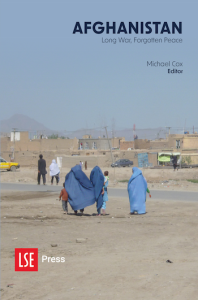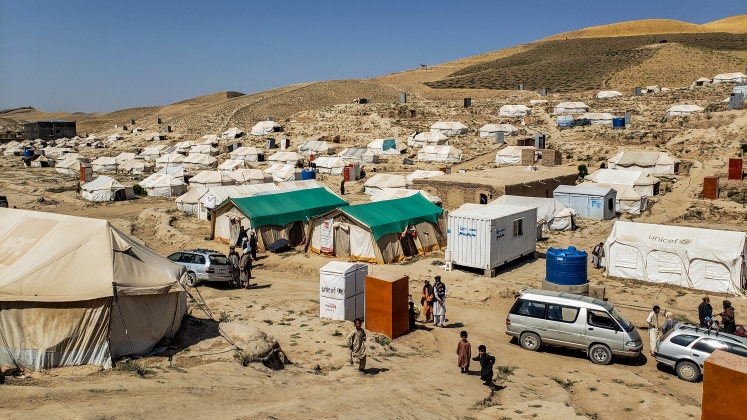In Afghanistan: Long War, Forgotten Peace, Michael Cox brings together scholars to analyse the failure of Afghan state-building, the Taliban’s resurgence and the country’s future. Anil Kaan Yildirim finds the book a valuable resource for understanding challenges the country faces, including women’s rights, the drugs economies and human trafficking and exploitation. However, he objects to the inclusion of a chapter which makes a geographically deterministic appraisal of Afghanistan’s governance.
Afghanistan: Long War, Forgotten Peace. Michael Cox (ed.). LSE Press. 2022.
This book is available Open Access here.
 In Afghanistan: Long War, Forgotten Peace, Michael Cox gathers scholars, policymakers, and public intellectuals to shed light on the factors contributing to the failure of Afghan state-building, the successful takeover by the Taliban, and to share some insights on the country’s future. The chapters in the collection impart valuable insights on international law, human trafficking, women’s rights, NATO, and the international drug trade, with the exception of one essay that uses a problematic framework in its analysis of Afghan statehood and seems out of place within the book.
In Afghanistan: Long War, Forgotten Peace, Michael Cox gathers scholars, policymakers, and public intellectuals to shed light on the factors contributing to the failure of Afghan state-building, the successful takeover by the Taliban, and to share some insights on the country’s future. The chapters in the collection impart valuable insights on international law, human trafficking, women’s rights, NATO, and the international drug trade, with the exception of one essay that uses a problematic framework in its analysis of Afghan statehood and seems out of place within the book.
One of the main tasks of any state-building process is to create a political sphere that includes all parties to decide on policies and strategies shaping the future of the country.
One of the main tasks of any state-building process is to create a political sphere that includes all parties to decide on policies and strategies shaping the future of the country. However, in the case of Afghanistan, as argued by Michael Callen and Shahim Kabuli in Chapter Three, the de facto power structure did not align with the de jure systems of institutions. Excluding the Taliban from political discussions, adopting a fundamentally flawed and exclusionary electoral system, and employing a centralised presidential system which did not correspond to Afghan “diversity and reality” have been the “three sins” of the Afghanistan project. Along with these mistakes, the authors also identify the issues that created a “dysfunctional” state-building, including the lack of complete Afghan sovereignty within regional power dynamics, the diversion of the US’s focus to Iraq, and other foreign influences such as Russia and China that tried to attract the power-holders of the country. This powerful essay points out the three sins in the creation of the structure and other dynamics that destabilised the country. Thus, the state-building project collapsed not because Afghanistan was unsuited to democracy, but because of a combination of many different mistakes.
The authors also identify the issues that created a “dysfunctional” state-building, including the lack of complete Afghan sovereignty within regional power dynamics, the diversion of the US’s focus to Iraq, and other foreign influences such as Russia and China
The role of women in the Afghan state-building effort is highly contested among different power holders, the international community, and the Taliban. Writing in this context in Chapter Six, Nargis Nehan explores the issue of women’s rights in Afghanistan before and after 9/11, positioning the matter within the spectrum of extremists, fundamentalists, and modernists. The highly masculinised country following many years of different wars created a challenging political and social area for women. Therefore, all changes in the political sphere resulted in a change in the lives of women.
Nargis Nehan explores the issue of women’s rights in Afghanistan before and after 9/11, positioning the matter within the spectrum of extremists, fundamentalists, and modernists.
As an internationalised state-building project, Afghanistan has challenged international institutions and norms. Devika Hovell and Michelle Hughes examine the US and its allies’ interpretation and application of international law in military intervention in Afghanistan. With discussion of several steps and actors of the intervention, they demonstrate how this operation stretched the definitions of self-defence, credibility, legal justification, and authority within international realm.
The book explores several other key problems in the country. These include Thi Hoang’s chapter on human trafficking problems such as forced labour, organ trafficking and sexual exploitation; John Collins, Shehryar Fazli and Ian Tennant’s chapter on the past and future of the international drug trade in Afghanistan; Leslie Vinjamuri on the future of the US’s global politics after its withdrawal from the state; and Feng Zhang on the Chinese government’s policy on Afghanistan.
The essays mentioned above demonstrate what happened, what could have been evaded and what the future holds for Afghanistan. However, the essay, “Afghanistan: Learning from History?” by Rodric Braithwaite is a questionable inclusion in the volume. By emphasising geographical determinism, this piece a problematic perspective on Afghanistan. The essay argues that the failure of the West’s state-building project was down to the “wild” character of Afghan governance historically, which he deems “… a combination of bribery, ruthlessness towards the weak, compromise with the powerful, keeping the key factions in balance and leaving well alone … (17)” or “… nepotism, compromise, bribery, and occasional threat” (26-27). This perspective paints a false image of how Afghan history is characterised by unethical, even brutal methods of governance. Also in this essay are many problematic cultural claims such as “… Afghans are good at dying for their country … (18).”
The limitation of the entire Afghan agency, history and political culture to a ruthless character and geography that always produces “terrible results” for state-building is a false narrative
The limitation of the entire Afghan agency, history and political culture to a ruthless character and geography that always produces “terrible results” for state-building is a false narrative, which is reflected in and supported by the postcolonial term for Afghanistan: the “graveyard of empires”. While many different tribes, states, and empires have successfully existed in the country, Western colonial armies’ defeats and recent state-building failures should not misrepresent the country as a savage place in need of taming. Rather, as the other essays in the book argue, research on these failures should examine the West’s role in precipitating them.
Not only does this piece disrespect the scholarship (including other authors of the book) by asserting the ontological ungovernability of the country, but its deterministic stance also disregards the thousands of lives lost in the struggle to contribute to Afghan life those who believed that the future is not destined by the past but can be built today. Additionally, using only three references (with one being the author’s own book), referring to the US as “America”, random usage of different terms and not providing the source of a quotation are all quite problematic for a lessons-learned-from-history essay.
Beyond the limitations of the essay in terms of how it frames the past, what is more damaging is the creation of a false image of Afghanistan for future researchers and policymakers. For the points mentioned above, including the false narrative of ‘graveyard of empires’, Nivi Manchanda’s Imagining Afghanistan: The History and Politics of Imperial Knowledge (2020) is worth consulting for in-depth insight into the colonial knowledge production system and its problematic portrayal of Afghanistan.
Braithwaite’s essay excepted, this book, exploring different political and historical issues from various perspectives, provides significant insights into what happened in Afghanistan and what the future holds for the nation
Braithwaite’s essay excepted, this book, exploring different political and historical issues from various perspectives, provides significant insights into what happened in Afghanistan and what the future holds for the nation. For practitioners, policymakers, and scholars seeking a broad perspective on state-building problems, policy limitations and relevant research areas in Afghanistan, this collection is a useful resource.
This post gives the views of the author, and not the position of the LSE Review of Books blog, or of the London School of Economics and Political Science. The LSE RB blog may receive a small commission if you choose to make a purchase through the above Amazon affiliate link. This is entirely independent of the coverage of the book on LSE Review of Books.
Image Credit: Trent Inness on Shutterstock.






